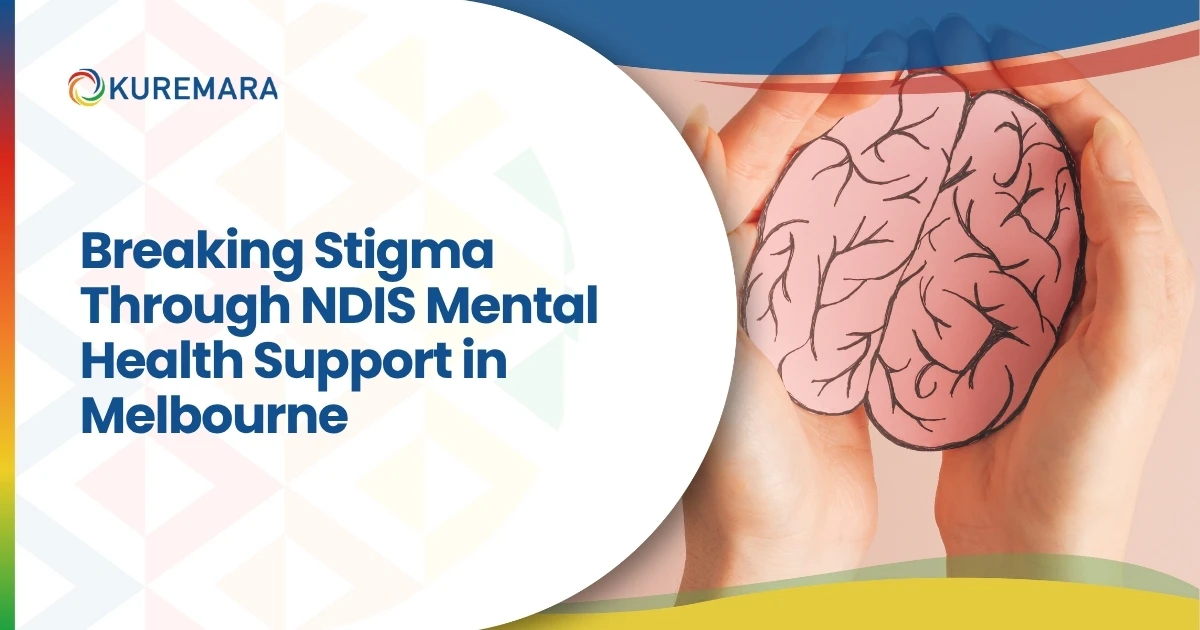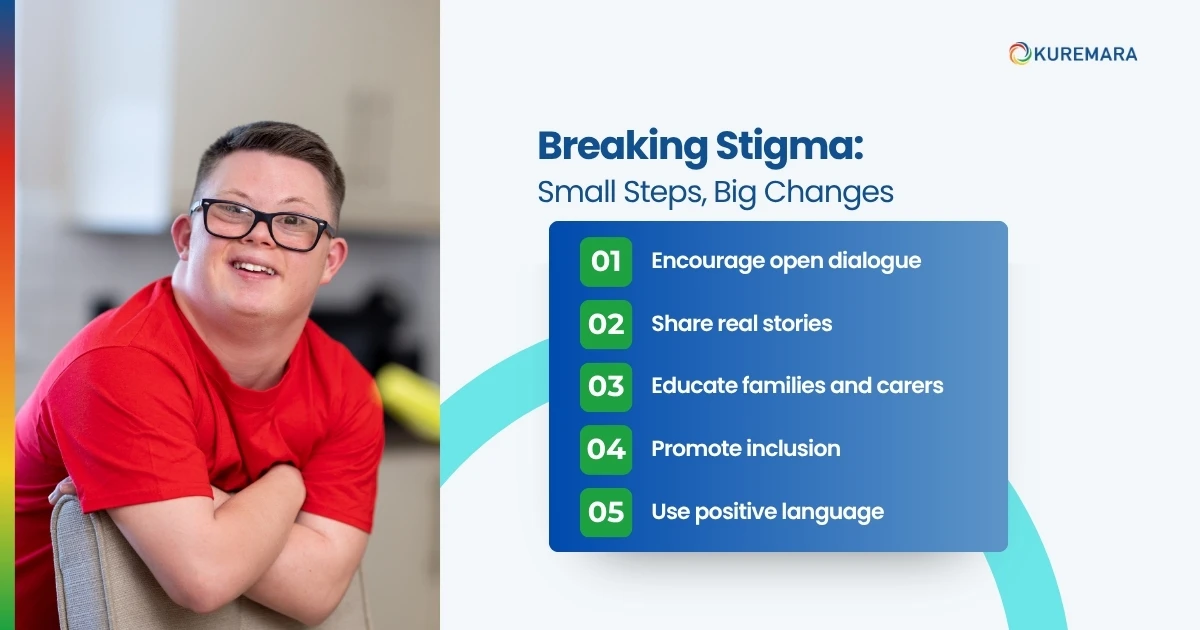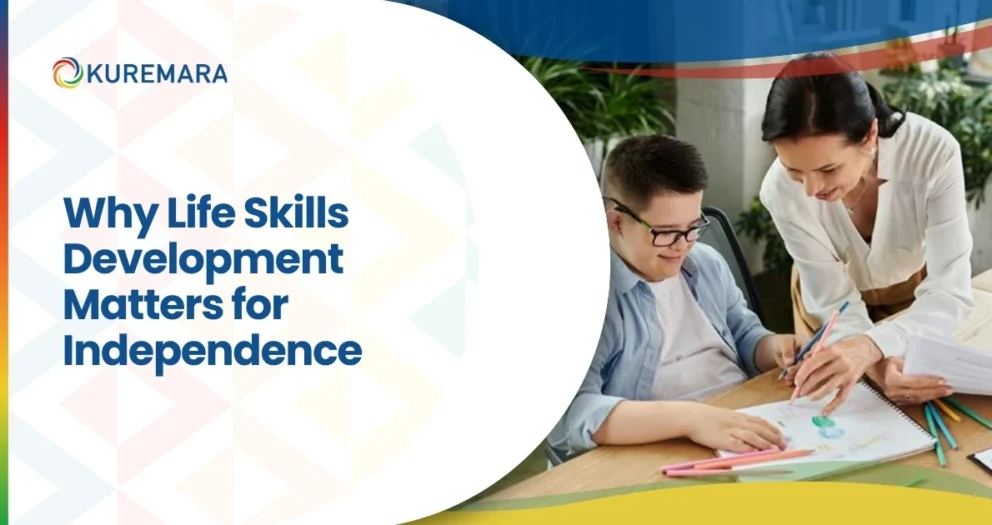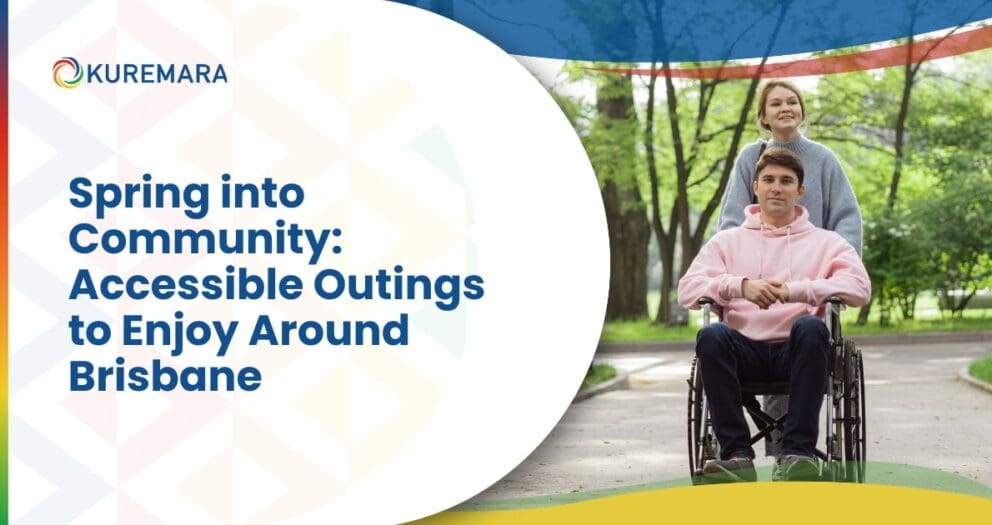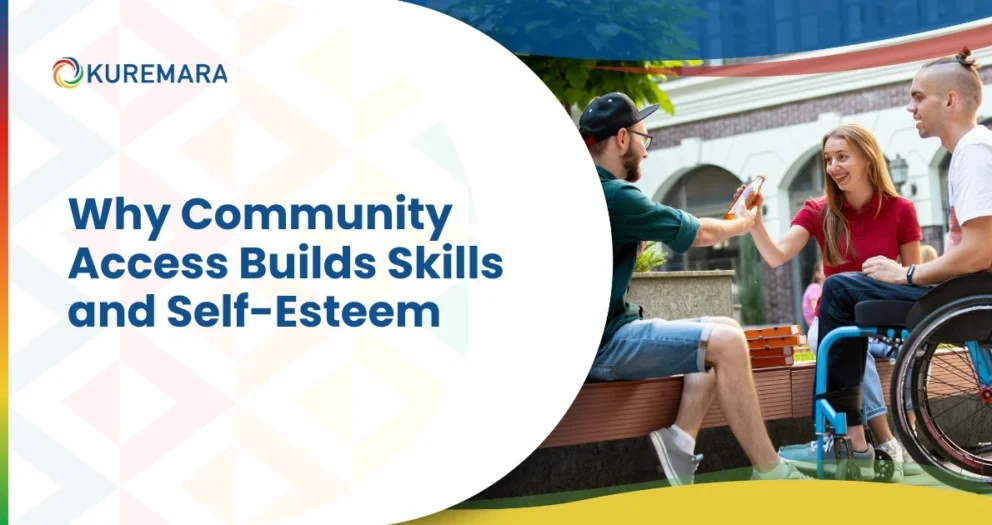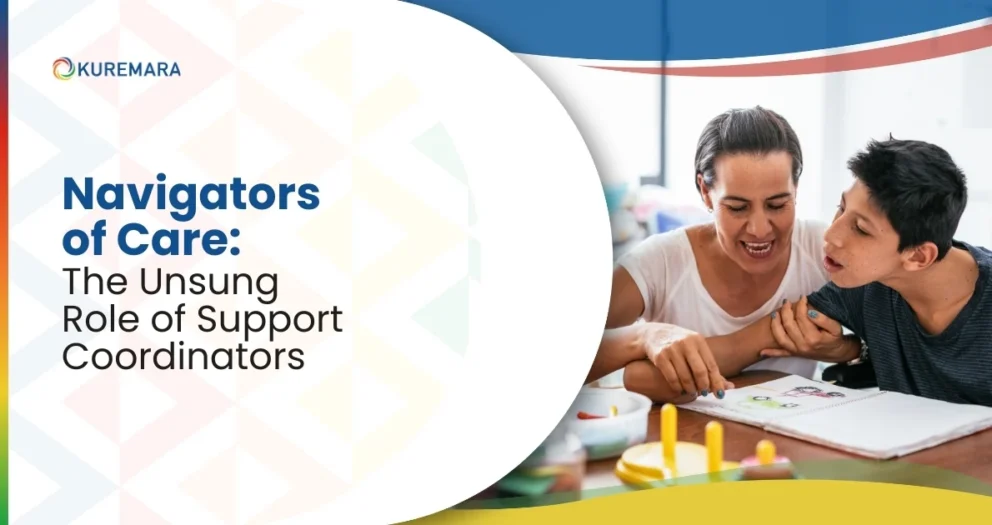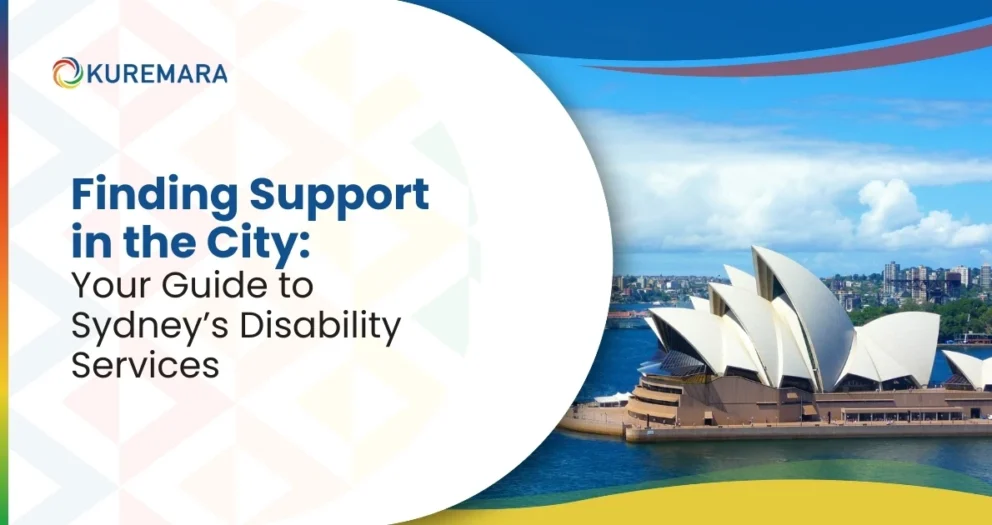Empowering every individual to live with confidence, inclusion, and independence.
Introduction: A New Conversation Around Mental Health
For many Australians, conversations about mental health have long been clouded by silence and stigma. While awareness is improving, the journey toward acceptance and understanding continues, especially for those living with psychosocial disabilities.
According to the Australian Bureau of Statistics, about 1 in 5 Australians (22%) aged 16–85 (Source: AIHW) will experience a mental disorder at some point in their lives. Despite these rates, stigma and delayed help-seeking remain major obstacles to care and recovery.
In Melbourne, a city known for its diversity and community networks, the NDIS (National Disability Insurance Scheme) is helping reshape this narrative. Through tailored, recovery-oriented supports, individuals are increasingly able to view their mental health as a dimension of strength rather than weakness.
At Kuremara, we’re proud to be part of that change. As a registered NDIS provider, our mission is to support not just diagnostic labels, but the whole person, their hopes, goals, and dignity.
Understanding Mental Health Disabilities and Stigma
A mental health or psychosocial disability arises when a mental health condition has a long-term impact on daily functioning, emotional regulation, social connection, or independence. Not every person with anxiety or depression qualifies, but when the condition substantially disrupts real-life participation, it may qualify as a disability under NDIS rules.
Unfortunately, individuals with psychosocial disabilities often face stigma, a mix of misunderstanding, judgement, and social isolation that can make recovery harder. Stigma can come from society, from peers, and sometimes even from within oneself.
In a multicultural hub like Melbourne, these experiences can differ widely. Cultural beliefs about mental health, access to community services, and family dynamics all shape how individuals perceive and manage their wellbeing.
By fostering inclusive environments and access to NDIS-funded supports, we can help participants move from feeling excluded to feeling understood, supported, and valued.
How the NDIS Supports Mental Health Recovery
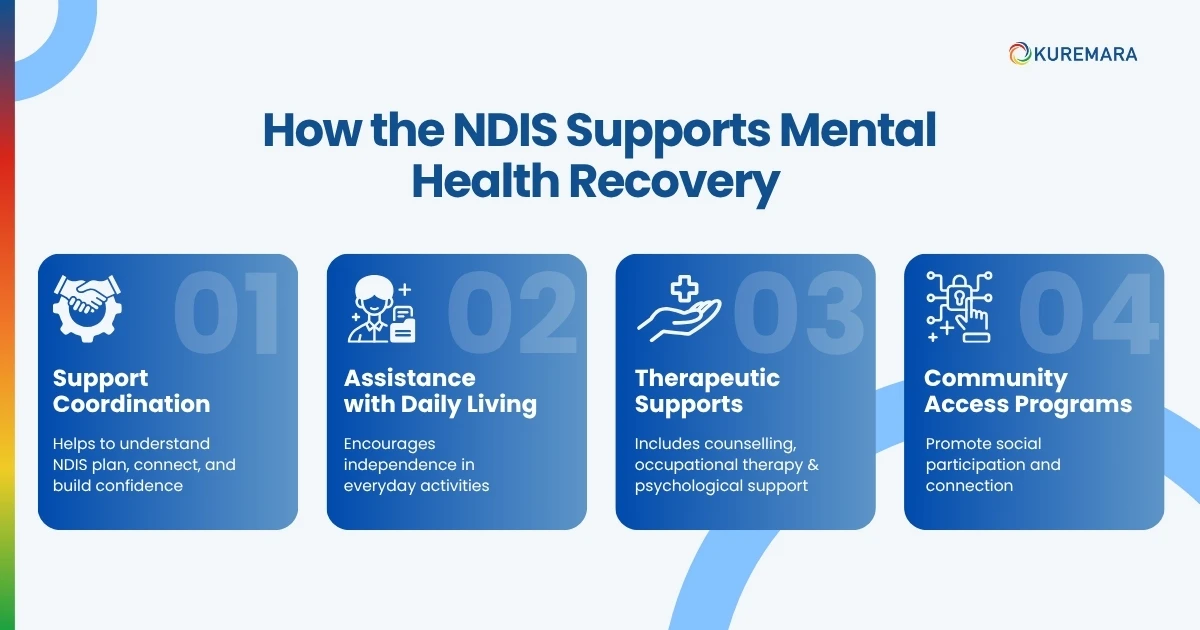
The NDIS recognises the importance of mental health by including psychosocial disability within its framework. It funds a range of supports that enable individuals to develop life skills, access therapy, and participate more fully in their communities.
As of 31 December 2024, 64,516 NDIS participants had a primary psychosocial disability, constituting about 9% of all active participants, with an average funding allocation of AUD 86,600 per person. (Source: Springer)
These figures reflect both growing inclusion and the level of resourcing needed to deliver quality support.
Here are some of the key ways the NDIS supports mental health recovery:
- Support Coordination: Helps participants understand their NDIS plan, connect with the right services, and build confidence in managing their supports.
- Assistance with Daily Living: Encourages independence in everyday activities like meal preparation, budgeting, and personal care, all of which can boost self-esteem.
- Therapeutic Supports: Includes counselling, occupational therapy, and psychological support, helping participants build coping strategies and resilience.
- Community Access Programs: Promote social participation and connection, vital for mental wellbeing.
By combining these supports, participants are empowered to set personal recovery goals, whether that means returning to study, forming friendships, or developing new life skills. The NDIS doesn’t just fund services; it funds hope and possibility.
The Melbourne Difference: Local Mental Health Support That Cares
Melbourne stands out as a city that celebrates diversity and community connection. Across its suburbs from Footscray to Frankston; people are embracing conversations around wellbeing. Initiatives like Beyond Blue, headspace, and local support groups are encouraging open discussions that normalise mental health care.
This culture of compassion is what makes NDIS mental health support in Melbourne so effective. Local providers like Kuremara understand that recovery is deeply personal. Each person’s story is shaped by their environment, their relationships, and the support they receive.
Our Melbourne-based team works alongside participants, families, and allied health professionals to ensure that support is consistent and culturally sensitive. Whether it’s helping someone attend community events or coordinating with their therapist, we aim to make each day a little brighter, calmer, and more connected.
Breaking Stigma: Small Steps, Big Changes
Breaking the stigma surrounding mental health doesn’t happen overnight, but it does start with small, meaningful actions. Here are some practical ways individuals, families, and communities can contribute:
- Encourage open dialogue: Talking about mental health in safe, judgement-free spaces helps normalise the topic.
- Share real stories: Hearing recovery journeys from others inspires hope and connection.
- Educate families and carers: Understanding how to respond with empathy can make a world of difference.
- Promote inclusion: Supporting people to engage in work, hobbies, and social activities helps rebuild confidence.
- Use positive language: Replacing labels like “sufferer” with “person living with” reinforces dignity and strength.
Kuremara actively promotes awareness through our community programs and inclusive campaigns that celebrate progress, resilience, and diversity.
You may also enjoy reading: Staying Active, Staying Happy: Motivational Tips for Physical and Mental Health
Together, these steps create ripple effects, transforming not only lives but communities.
The Melbourne Difference: Local Mental Health Support That Cares
Victoria’s state mental health reforms show promising trends. The latest Victorian Mental Health & Wellbeing Commission report notes increased investment in community-based services, while seclusion rates in institutional settings have declined. (Source: mhwc.vic.gov.au) These efforts highlight a shift toward early intervention, less restrictive care, and safety reform.
For a participant in Melbourne, these shifts matter deeply. A support worker who knows local transport, understands nearby community groups, or liaises with surrounding services makes a real difference.
Kuremara’s Melbourne team works in this evolving ecosystem, collaborating with local health providers, peer networks, and community organisations to bring more than support: connection, continuity, and culturally appropriate care.
The Role of Support Workers in Mental Health Recovery
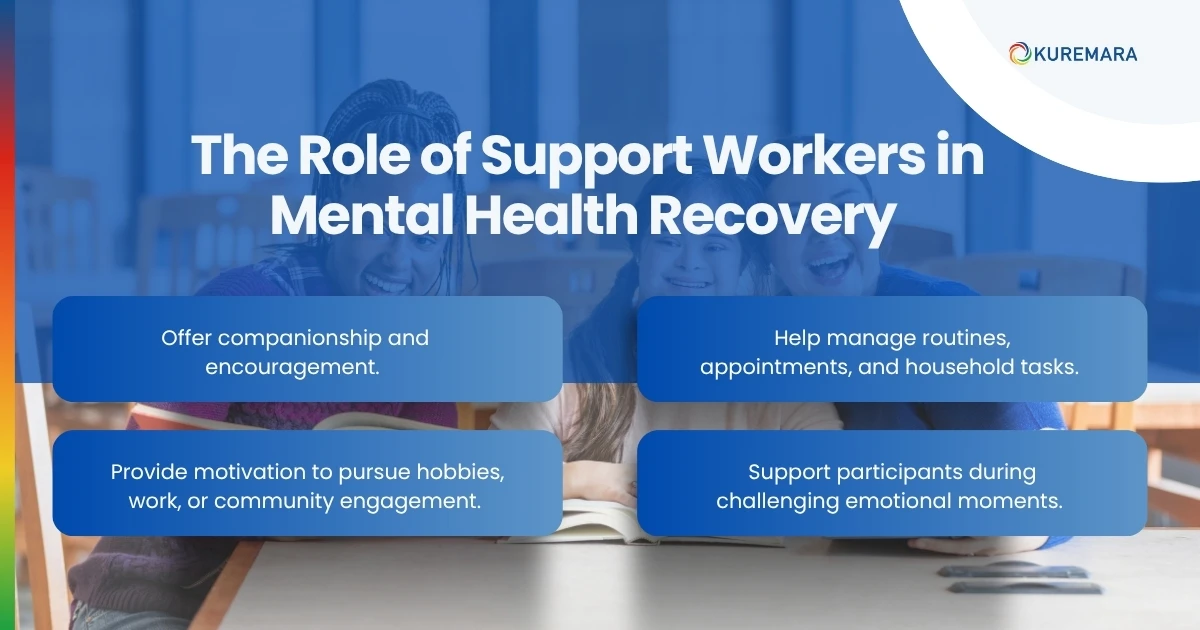
Behind every successful recovery journey, there’s often a compassionate support worker guiding the way. These professionals play an essential role in empowering participants to live independently and meaningfully.
Unlike clinical professionals who focus on diagnosis or treatment, support workers provide practical, emotional, and social assistance in day-to-day life. They:
- Offer companionship and encouragement.
- Help manage routines, appointments, and household tasks.
- Provide motivation to pursue hobbies, work, or community engagement.
- Support participants during challenging emotional moments.
At Kuremara, our support workers undergo rigorous training and screening to ensure that every participant receives safe, respectful, and person-centred care.
Whether it’s a simple walk through a local park or helping someone plan their week, these small acts of support build confidence and stability, cornerstones of long-term wellbeing.
Explore our In-Home Support and Community Access services to see how our team works side by side with participants.
How Kuremara Is Leading the Change
At Kuremara, we believe in transforming lives through compassion and capability. Our approach to NDIS mental health support in Melbourne is not about fitting people into programs, it’s about designing supports that fit their lives.
We take time to understand each participant’s strengths, challenges, and goals. Our tailored supports may include:
- Assistance with daily living and personal routines
- Emotional and behavioural support
- Skill-building programs for independence
- Coordination with healthcare and community providers
- Encouragement to engage in social and recreational activities
Our team is trained to recognise that recovery is a journey, not a destination. By creating a network of care that extends from home to community, we ensure participants feel empowered, not defined, by their diagnosis.
Kuremara’s philosophy is simple: everyone deserves to feel heard, valued, and supported. That belief drives our mission to deliver mental health support that fosters connection, growth, and long-term wellbeing across Melbourne and beyond.
Success Stories: From Isolation to Inclusion
At Kuremara, we’ve seen firsthand how mental health support changes lives.
One of our participants, for instance, began their journey feeling anxious and socially withdrawn after years of struggling with depression. Through consistent one-on-one support, encouragement to attend group activities, and collaborative goal-setting, they gradually regained confidence to socialise, volunteer, and pursue hobbies they once loved.
Stories like these remind us that breaking stigma is not about perfection; it’s about progress. Each step forward, no matter how small, is a victory worth celebrating.
How to Access Mental Health Support Through the NDIS
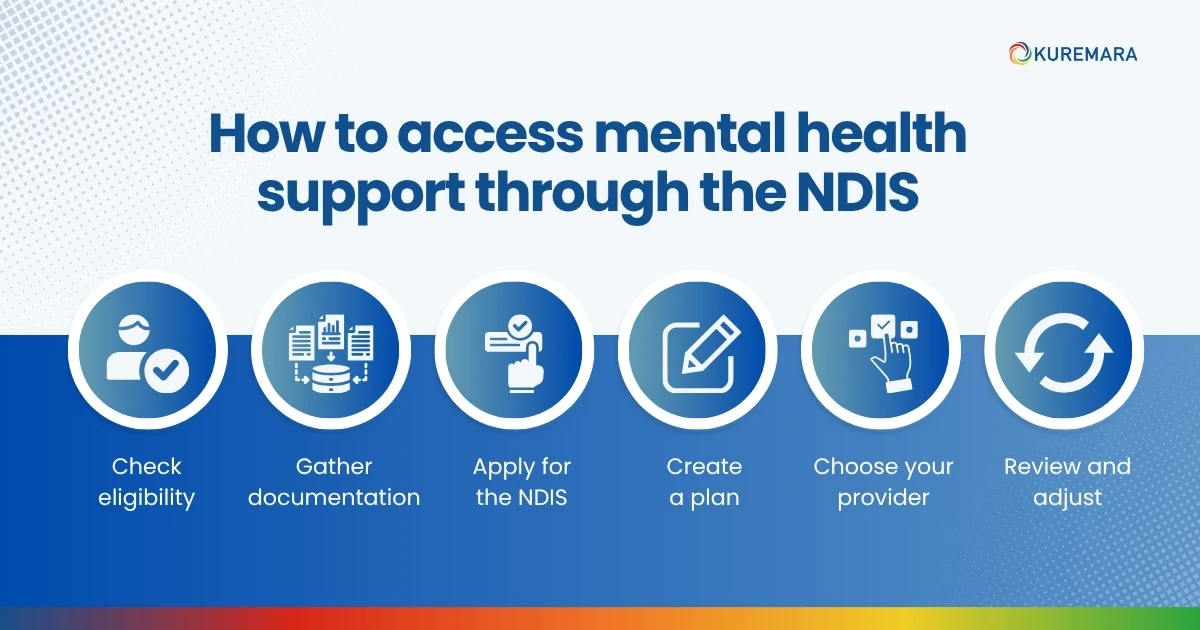
Navigating the NDIS can feel overwhelming at first, but understanding how to access psychosocial supports makes the process easier. Here’s a quick step-by-step guide:
1. Check eligibility: You may be eligible if you live with a mental health condition that affects your everyday life and is likely to be permanent.
2. Gather documentation: Evidence from a GP, psychologist, or psychiatrist helps support your application.
3. Apply for the NDIS: Submit your application through the National Disability Insurance Agency (NDIA).
4. Create a plan: Once approved, you’ll meet with a planner or Local Area Coordinator to outline your goals and required supports.
5. Choose your provider: Select an NDIS-registered provider like Kuremara to help implement your plan and deliver the right supports for your needs.
6. Review and adjust: Your NDIS plan can evolve as your goals and circumstances change.
If you’re already an NDIS participant, you can ask your Support Coordinator or Planner to include mental health support services through Kuremara in your next plan review.
Conclusion: Empowering Change, One Conversation at a Time
Breaking the stigma around mental health isn’t just about awareness, it’s about action. Every conversation, every support session, and every act of compassion helps build a more inclusive community.
For Melbourne residents living with psychosocial disabilities, the NDIS offers more than funding; it offers a foundation for confidence, hope, and recovery. With more than 64,000 participants relying on mental health support in the NDIS, and nearly half of help-seekers in high distress, the stakes are high.
At Kuremara, we’re committed to walking this journey with our participants, supporting them to take control of their wellbeing, connect with their community, and celebrate their achievements along the way.
If you or someone you know is ready to take the next step toward recovery and independence, reach out to Kuremara today to explore our NDIS mental health support services in Melbourne.
Frequently Asked Questions
1. What type of mental health supports are funded by the NDIS?
The NDIS can fund supports such as counselling, support coordination, daily living assistance, community participation, and psychosocial recovery coaching, depending on individual needs.
2. Can I access NDIS support if I have anxiety or depression?
Yes, if your condition significantly impacts your daily life and is likely to be long-term, you may be eligible for NDIS psychosocial supports.
3. How does Kuremara’s mental health support differ from clinical therapy?
Kuremara’s services focus on practical, social, and emotional support that complements clinical care, helping participants apply coping strategies in real-life situations.
4. Do you provide mental health support services across Melbourne?
Yes, our team offers person-centred NDIS mental health support throughout Melbourne and the surrounding suburbs.
5. How do I start receiving mental health support through my NDIS plan?
You can contact Kuremara directly or speak with your Support Coordinator about including our services in your plan.
 care@kuremara.com.au
care@kuremara.com.au
